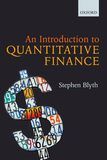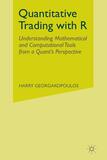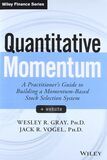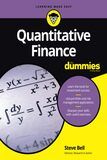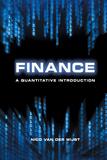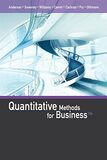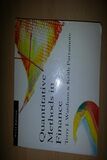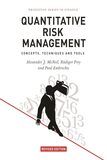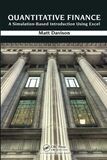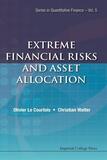10 Best Quantitative Finance Books [2025]
As a quantitative financial analyst, your job is to see through a vast database and discover patterns so that you can reduce risk and increase profits. Below is the list of the top 10 best quantitative books:
- An Introduction to Quantitative Finance ( Get this book )
- Quantitative Trading with R ( Get this book )
- Quantitative Momentum ( Get this book )
- Quantitative Finance For Dummies ( Get this book )
- Finance: A Quantitative Introduction ( Get this book )
- Quantitative Methods for Business ( Get this book )
- Quantitative Methods for Finance ( Get this book )
- Quantitative Risk Management ( Get this book )
- Quantitative Finance ( Get this book )
- Extreme Financial Risks and Asset Allocation (Series in Quantitative Finance) ( Get this book )
Let us discuss each quantitative finance textbook in detail, along with its key takeaways and reviews.
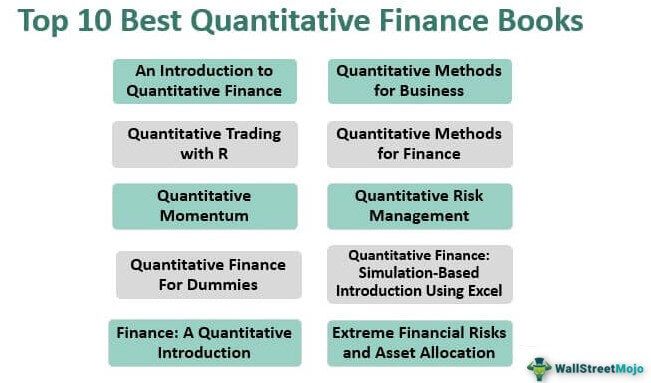
#1 - An Introduction to Quantitative Finance
The author is a professor of the practice of statistics and a managing director of Harvard Management Company, which is at Harvard University. It means an expert writes the captioned book. It is simple to understand a short infancy book and must be bought to understand the basics of quantitative finance.
Book Name & Author
An Introduction to Quantitative Finance
by Stephen Blyth
Book Review
Blyth has included financial derivatives with complex financial transactions simplified with fascinating mathematical tricks of every type in this book. In addition, the book provides a meticulous yet handy-to-handle mathematical problem as the author has met trading derivatives on Wall Street.
Best Takeaway
This best quantitative finance textbook includes no special preparation or exposure to finance as it gives you all the required information and related knowledge. The author also exposes the readers quickly to the theories and problems of quantitative finance. It has also helped students in applying the theories.
#2 - Quantitative Trading with R
Understanding Mathematical and Computational Tools from a Quant’s Perspective
The author has provided a situation of learning how to create quantitative strategies with the help of software. He is a practitioner and an expert in the field of quantitative finance. This text has developed the concepts of financial Math and computing, along with an introduction and developed it together. Many readers and practitioners have echoed the author's unique conversational writing style. This book offers a winning strategy.
Book Name & Author
Quantitative Trading with R: Understanding Mathematical and Computational Tools from a Quant’s Perspective
by— Harry Georgakopoulos
Book Review
This best quantitative finance textbook gives you complete information on quantitative finance and is excellent for developing trading strategies. It is full of notes, tutorials, references, and suggestions. Its thoughtful style also includes calculating hedge fund ratios. After reading this book, you can judge where to go and what to do with relative topics. This book is very beneficial for beginners and learners.
Best Takeaway
It is an excellent book for beginners and advanced learners of quantitative finance. The use of R coding and applying theories in financial modeling is done brilliantly by the author. He has also very smartly combined financial theories, math, and statistics. It is a systematic and very thoughtful tour of quantitative techniques.
#3 - Quantitative Momentum
A Practitioner’s Guide to Building a Momentum-Based Stock Selection System (Wiley Finance)
This best quantitative finance textbook is one of the few systematic financial strategies with legs, as most systematic financial strategies fail. The author's strategy has withstood the test of time and challenging academic investigations. The author has simplified this theory in his book. He helps and guides the readers to generate their monument strategy right from the start.
Book Name & Author
Quantitative Momentum: A Practitioner’s Guide to Building a Momentum-Based Stock Selection System (Wiley Finance)
by - Wesley R. Gray, Jack R. Vogel
Book Review
This top quantitative finance book covers 1. Learn what a monument is and is not 2. Discover how monuments can beat the market. 3. Take monuments beyond asset allocation and stock selection. 4. Access the tools that ease DIY implementation and many more critical topics and explain this book. This book will help you enrich your portfolio through monument investing strategies.
Best Takeaway
Learning monuments, their importance, and their implementation to help you increase your portfolio's value can help you mend money in the financial industry. If you wish to understand systematic financial strategies and their implementations, this is the perfect book to have in your collection.
#4 - Quantitative Finance For Dummies
Quantitative finance is a challenging subject and hence does not drive you alone crazy it drives many others mad. However, this top quantitative finance book has described finance in straightforward language, which makes sense to learners and beginners to help you apply mathematics to investing decisions. Furthermore, the author has tried to explain future options and risks in simple language.
Book Name & Author
Quantitative Finance For Dummies
by - Steve Bell DPhil
Book Review
This book is an understandable and complete introduction to quantitative finance. It smartly covers the core model, methods, and formulas of quantitative finance. It helps you understand quantitative finance with the help of exercises and examples. Complex words of quantitative finance are followed by easy to follow introductions. And the list goes on.
Best Takeaway
This top quantitative finance textbook includes quantitative finance methods, which are very useful in defining the current situation of the market value of the derivative securities. These methods are must-learn and must-know methods.
#5 - Finance: A Quantitative Introduction
This quantitative finance book is a fantastic guide to modern finance. The reason for being an excellent guide is that the author gives a clear and detailed understanding of the subject. This book has a good range and clarity. Hence, he is very famous for the same. Here modern finance is introduced to readers by providing a robust theoretical base for the subject.
Book Name & Author
Finance: A Quantitative Introduction
by - Nico van der Wijst
Book Review
A preliminary review of modern finance is the face of this book. With the help of mathematical models, this book treats modern finance. The comprehensive description of finance makes this book easy to read, and the straightforward content makes it easy for the readers to understand financial concepts. Besides being a technical book, the author kept the content lively.
Best Takeaway
Quantitative and accessible finance is the best thing about the book. Finance is usually challenging to understand. Hence, it could be more interesting for the readers. However, the author has ensured that the book is understandable and accessible to every reader.
#6 - Quantitative Methods for Business
What are quantitative methods, and how can you multiply the power of these methods as the main target of the author's content? He confirms that you must be a mathematician to use a quantitative method. Therefore, you must read this book to make intelligent and prosperous financial decisions. The author comes from a quantitative analysis background and shares his experiences with you to help you understand the subject better.
Book Name & Author
Quantitative Methods for Business
by David R. Anderson, Dennis J. Sweeney, Thomas A. Williams, Jeffrey D. Camm, James J. Cochran
Book Review
This book on quantitative finance includes the latest trends of the market, the industries, finance, etc., issues faced by the industry, and practice methods from various fields. The author guides you step by step by applying the concepts and techniques of mathematics. He has also used a memorable real-life experience demonstration to explain better.
Best Takeaway
The author has convoluted the solutions for uncertainties using Microsoft Excel to draw and demonstrate simulation modeling. It also includes the difference between the holistic approach in project management. An utterly up-to-date experience of quantitative finance is shown in this book.
#7 - Quantitative Methods for Finance
This book on quantitative finance focuses on the natural world and the people who practice it here. The book is precious for people with little or no knowledge of statistics and calculations. The author has used various quantitative models and explained why one had used the same. He has used clear examples and built complicated subjects of simple principles.
Book Name & Author
Quantitative Methods for Finance
by Terry Watsham (Author), Keith Parramore
Book Review
This quantitative finance book has explained rigorous mathematical and statistical application methods relevant to modern financial instruments and risk management techniques. This book is for readers who still need to be completed by mathematical experts. However, they understand analysis as it works as a reward even for the most experienced lot.
Best Takeaway
If you are seeking grounding in quantitative methods, this book is a good reference. This book underlines the pricing of assets, portfolio management, risk management, derivatives, etc., which are a good way of understanding quantitative finance methods.
#8 - Quantitative Risk Management
Concepts, Techniques, and Tools (Princeton Series in Finance)
This quantitative finance book is very clearly not a 'How to' book, which is why it does not include any step-by-step mathematical calculations or QF information. This book is a 'Why' book, which is why the author has made sure he has explained the subject radiantly. You must have a solid mathematical background and knowledge to understand the writer.
Book Name & Author
Quantitative Risk Management: Concepts, Techniques, and Tools (Princeton Series in Finance)
by - Alexander J. McNeil (Author), Rüdiger Frey (Author), Paul Embrechts
Book Review
This book on quantitative finance includes a complete revision and expansion of the developments in the fields of finance post-financial crisis. The writer has explained the subject in small chapters to help you understand them better. In addition, he has covered solvency in an expanded manner. He has also given treatments for credit risk and managing insurance risks along with counterparty credit risks and pricing of COE.
Best Takeaway
The writers have covered advanced topics in this book. However, his motive is not to give you a detailed step-by-step; he explains the concepts and the terms of QF in detail. Instead, he has used a standard industry approach to help you explore key concepts and basics.
#9 - Quantitative Finance
A Simulation-Based Introduction Using Excel
Practitioners and researchers in the field of QF have only sometimes succeeded. Here, the writer has succeeded with his methods based on his experience. The writer is a dean and a professor in the faculty of science for statistics and actuarial science at the University of Western Ontario. The expert has brought you a direct and practical approach to the subject.
Book Name & Author
Quantitative Finance: A Simulation-Based Introduction Using Excel
by - Matt Davison
Book Review
Matt has given very modest and actual levels of mathematical background to guide students to become successful quantitative analysts. The book has used both hand and excel sheet calculations to find many examples from straightforward and also complex portfolios of bonds. In addition, he has thoroughly discussed pricing, mainly continuous times. Finally, the chapters concluded with educational models of the incomplete market and the yield curve using straightforward discrete models.
Best Takeaway
The author has introduced risk, return, and decision-making when calculating the uncertain cash flow of traditional discount projects, mortgages, bonds, and Excel simulation for annuities.
#10 - Extreme Financial Risks and Asset Allocation (Series in Quantitative Finance)
Every financial crisis has something to learn from it, its novelties, mechanisms, extreme financial risk along with asset allocations. The author brings to your theories and methods after analyzing such crises. These methods and techniques are usually found in very highly technical books. It is a beneficial book for financial engineers. Therefore, you must have this book in your collection if you are one of these analysts and engineers.
Book Name & Author
Extreme Financial Risks and Asset Allocation (Series in Quantitative Finance)
by - Olivier Le Courtois (Author), Christian Walter
Book Review
This top book on quantitative finance is suitable for researchers, graduate students, and engineers of a financial background, especially in Mathematics and Quantitative Finance. This book is based on a very high-risk environment where asset prices fluctuate to sudden, unpredictable changes. These occurrences, known as jumps, are explained, and their role and practice are explained extremely well by the writer.
Best Takeaway
Techniques and methods found in highly technical books are the genuine charms of this book. In addition, recent educational work is highlighted and beautifully presented in this book. Therefore, this book is just perfect for a specific group of readers.
Amazon Associate Disclosure
WallStreetMojo is a participant in the Amazon Services LLC Associates Program, an affiliate advertising program designed to provide a means for sites to earn advertising fees by advertising and linking to amazon.com.
